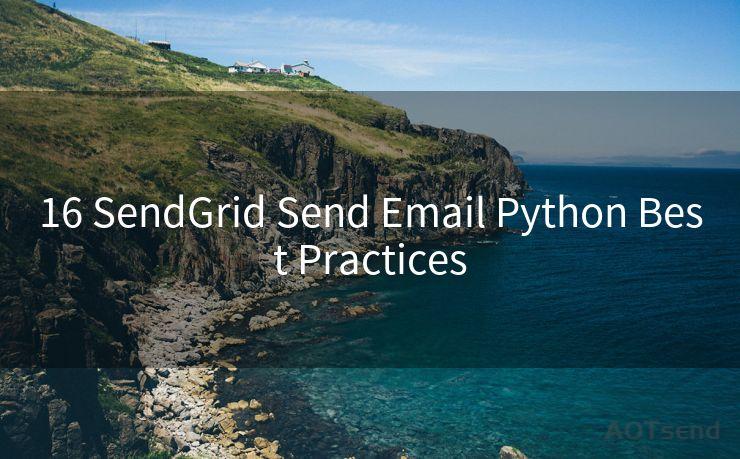16 SendGrid Send Email Python Best Practices




When it comes to sending emails programmatically, SendGrid stands out as a popular choice due to its reliability and scalability. In this article, we'll explore the top 16 best practices for using SendGrid to send emails in Python, ensuring both efficiency and compliance.
1. Set Up Authentication Correctly
Before you can send emails through SendGrid, you need to set up authentication properly. Make sure you have your SendGrid API key and that it's securely stored. Never hardcode your API key in your code; use environment variables or a secure credential storage system instead.
2. Validate Email Addresses
Always validate email addresses before sending messages. Invalid email addresses can cause delivery failures, wasting resources and potentially damaging your sender reputation. Utilize Python libraries like email-validator to ensure address validity.
3. Follow Email Best Practices
Adhere to email best practices, such as using a clear and concise subject line, avoiding spammy words, and including a text-based alternative to HTML content. These practices improve deliverability and enhance the user experience.
4. Handle Unsubscribes Gracefully
Include an unsubscribe link in every email you send. Not only is this a legal requirement in many countries, but it also helps maintain a positive relationship with your recipients.
5. Monitor and Handle Bounces and Complaints
Set up webhooks or use the SendGrid Event Webhook to monitor bounces, complaints, and unsubscribes. Use this data to clean your email list and improve future campaigns.
6. Optimize Email Delivery Times
Consider the best time to send emails based on your target audience's time zone and preferences. This can significantly improve open and click-through rates.
7. Personalize Email Content
Personalization is key to engaging recipients. Use merge tags or dynamic content to insert recipient-specific information into your emails.
8. Test Emails Before Sending
Always send test emails to yourself or a colleague before sending to your entire list. This helps catch any formatting issues or broken links.
9. Use Transactional Templates
SendGrid's transactional templates allow you to create reusable email templates, saving time and ensuring consistency across your emails.
10. Manage Your Sender Reputation
Maintain a good sender reputation by following email best practices, monitoring bounce and complaint rates, and avoiding spam-like behavior.
11. Handle Rate Limits and Retries
Be aware of SendGrid's rate limits and implement retry logic with exponential backoff to handle temporary failures gracefully.

12. Utilize Analytics and Tracking
Make use of SendGrid's analytics and tracking features to measure the performance of your emails. This data is crucial for optimizing future campaigns.
13. Secure Your Email Content
Ensure that sensitive information in your emails is properly secured, especially if you're sending transactional emails like password resets or account confirmations.
14. Comply with Anti-Spam Regulations
Familiarize yourself with anti-spam regulations like CAN-SPAM and CASL, and make sure your emails comply with these laws.
15. Keep Your Email Lists Clean
Regularly clean your email lists to remove inactive or bounced email addresses. This helps maintain a healthy sender reputation and improves deliverability.
16. Stay Up to Date with SendGrid Updates
Keep an eye on SendGrid's official blog and documentation for updates, new features, and best practices. Staying informed helps you make the most of the platform.
By following these best practices, you can effectively use SendGrid in Python to send emails that are both efficient and compliant. Remember, email marketing is about building trust and providing value to your recipients, so always strive to send relevant and engaging content.




🔔🔔🔔
【AOTsend Email API】:AOTsend is a Managed Email Service for sending transactional emails. Support Email Types: reminders, authentication, confirmations, notifications, verification codes, invoices, password resets, account activations, billing statements, two-factor authentication (2FA), and one-time passwords (OTP) emails, etc. $0.28 per 1000 Emails. 99% Delivery, 98% Inbox Rate.
You might be interested in:
Why did we start the AOTsend project, Brand Story?
What is a Managed Email API, How it Works?
Best 25+ Email Marketing Platforms (Authority,Keywords&Traffic Comparison)
Best 24+ Email Marketing Service (Price, Pros&Cons Comparison)
Email APIs vs SMTP: How they Works, Any Difference?
Scan the QR code to access on your mobile device.
Copyright notice: This article is published by AotSend. Reproduction requires attribution.
Article Link:https://www.mailwot.com/p6686.html



